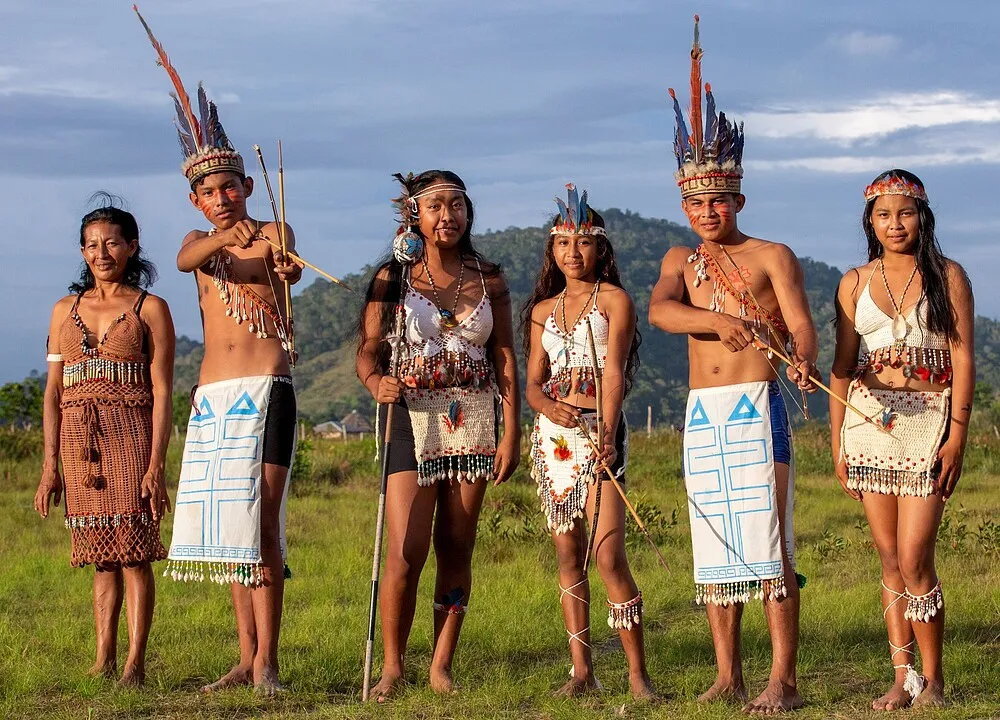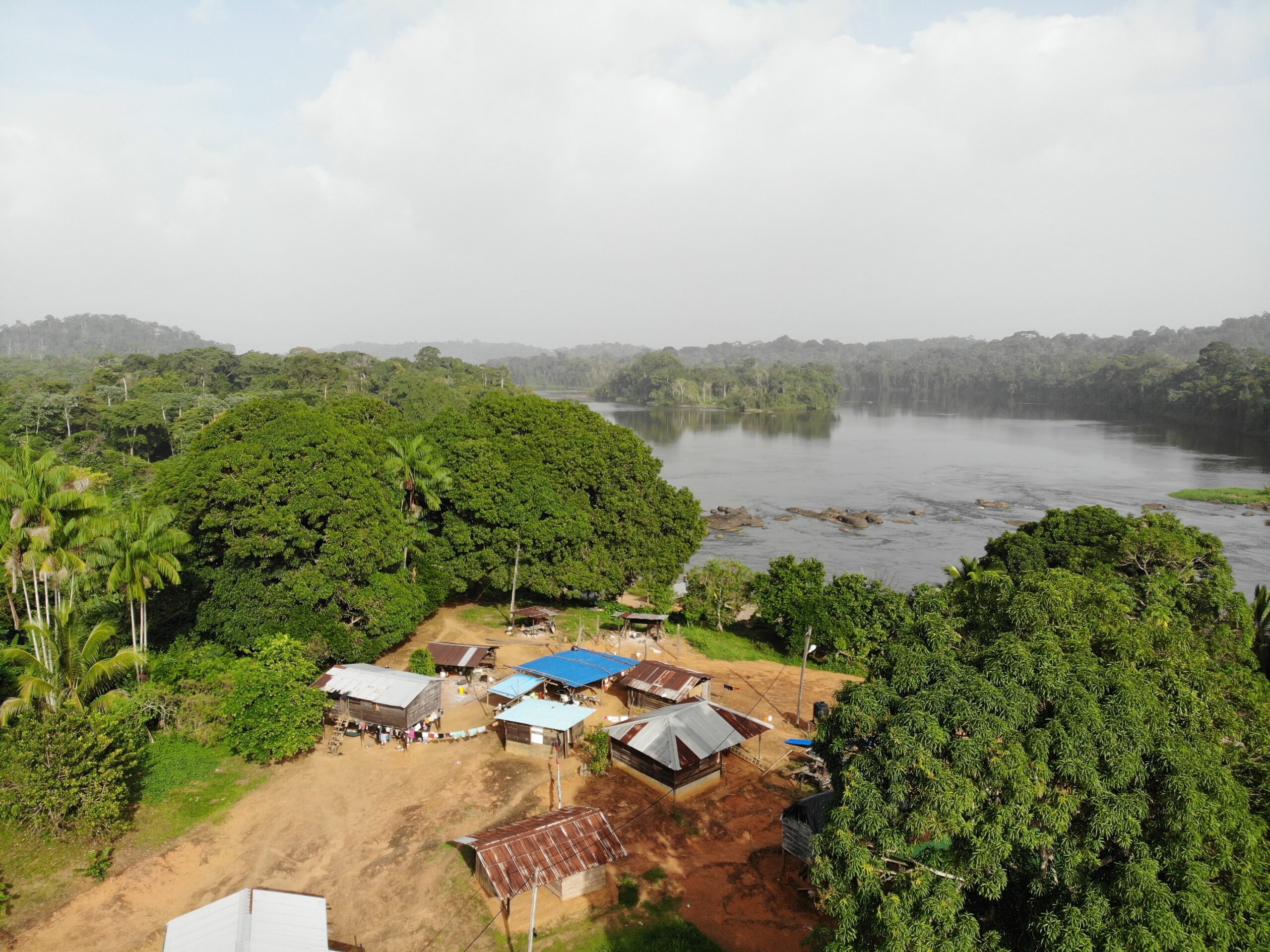By Stefanie Lauchman, Candice Stewart, and Samuel Sukhnandan
According to the Commonwealth Fund, climate events that trigger destruction, loss, and displacement of people ‘can sometimes lead to an array of mental health problems, from anxiety and feelings of helplessness to depression, post-traumatic stress disorder (PTSD), and suicidal thoughts’. These concerns, and more, occupy the lives of indigenous people within the Caribbean. This is a story about the experiences of indigenous communities in Suriname, Jamaica, and Guyana.
“I am at a point where I don’t know what to do anymore, first it rains continuously and all our crops are flooded. Now the weather is extremely dry and the ground has become infertile and yet again our crops cannot be harvested. Then on the other hand, the temperatures are so high that even the water in the river has dried up, something that we are not used to. I’m just tired”
This is a fragment of a conversation with J.A., an indigenous woman in Suriname who wishes to remain anonymous. She is currently struggling with her mental health, but has built up the courage to share her story. J.A. is a 35 year old mother of 4, living with her partner and children in the village. Their daily livelihoods depend on traditional practices such as fishing, hunting and agriculture. This way of living, where ancestral knowledge plays a key role, is being severely tarnished by climate change. Traditional knowledge on when crops can be planted in order to guarantee a successful harvest are becoming less and less accurate due to changing climate and weather patterns. Less crops are harvested and food security is not guaranteed. To make matters worse, the temperature is as high as it has ever been, causing more distress.
When it comes to the climate crisis, the health aspect, specifically mental health, is often overlooked. In the past years, research has indicated that the repercussions of climate change and global warming are associated with high levels of stress and poor mental health.
J.A. shares that just like other villagers, she has had a rough time adapting to the effects of climate change. The traditional way of living can no longer be sustained. Due to so many failed harvests, providing for the family has become difficult due to food shortages. “The situation is unbearable and we are at its wits end. The stress has even begun to affect the relationship with my husband”, she says in a weak voice.
As indicated with J.A. ‘s experience, it is clear that climate change and climate change events can negatively impact the mental health of individuals and their community. For Kasikeíani KaikoTekina (Chieftainess Ronalda Pairman) of the Yameye Guani Taino Peoples (Jamaica Hummingbird Taino Peoples), this rings true, especially when it comes to the relationship they share with the land.
“The essence of who we are is tied into the land. This includes our food, cultural and ceremonial practices. So, when a disconnection takes place due to displacement primarily caused by climate change events, it negatively impacts us,” she said.
“With climate change, our way of life, in every aspect, is impacted. One of the biggest impacts is through agriculture, practices, ceremonial way of life, and the dynamism of the ecosystems surrounding us,” she added, noting that with climate change events, everything the Taino in Jamaica are used to has changed for more reasons than one.
“Climate change events such as hurricanes Gilbert (1988) and Ivan (2004) caused such irreparable damage where people lost their homes, family, and their all-round way of life. That triggered a disconnection through displacement and loss of our homes, our land, and our ways of doing things. Having to relocate and start over is traumatic. Not just for us as Taino people, but for anybody.” she shared.

Credit: Chieftainess Ronalda Pairman
The Kasikeíani continued by highlighting how coastal erosion has also impacted the community, making special reference to the Hellshire beach in Portmore, St. Catherine, which no longer looks like a beach due to consistent rising sea levels.
“We do a lot of fishing but with the rising sea levels, that activity is severely impacted. As indigenous people, many of us used to live along the coast, but not anymore. The sea has claimed the land,” she said.
The Chieftainess said that the mental stress and trauma due to climate change events continuously cause psychological damage as it: “essentially forces all impacted people, especially the indigenous, to leave behind their life as they know it. It was a life in which they connected with their ancestors. However, to leave and go somewhere new and strange is not easily accepted”, she said, stressing that there is mental strain in having to move, and build a new connection to a new space.
“In this new space, there is no more comfort because your ancestors are no longer surrounding you. Additionally, our children will not have the level of connection that they ought to and this contributes to our generational disconnection” she added.
The Chieftainess emphasised secondary causes for mental strain on community members who have to adapt and adjust some of their ceremonial practices in the new spaces that they occupy.
“For example, when we wake up in the mornings, we greet the sun. If we’re going to plant anything, we connect with Yúcahu or Father Sky and the spirit of fertility. So, when we put our gardens together for our food, we want to have a good fruiting season, and as such, we have the ceremony with Yúcahu to bless the conuco (garden). With climate change events, it has become more difficult to hold on tightly to our ancestral ways,” she explained.
“When we are with our people, our ceremonial practices are considered normal because it’s within our space. When we are displaced, persons who are unfamiliar with our culture deem it as evil and obeah, which is frowned upon in the country. So, the first time somebody sees us dancing around what appears to them to be a stone, and singing your songs, they automatically categorise us as obeah workers. That’s far from the truth,” she explained further.
In a 2022 report, ‘International Religious Freedom: Jamaica’, it was stated that “a colonial era law criminalising Obeah and Myalism remains in effect. Potential punishment for practicing Obeah and Myalism includes imprisonment of up to 12 months. The government, however, does not enforce this law.” Additionally, the practice is frowned upon within the country.
The Chieftainess went on to share a personal experience where her neighbour heard the sound of her family’s guamo (conch shell) and seemingly prepared to apply prejudicial behaviours.
“Where I live, we put out a spirit plate whenever we have a meal. Whatever we eat, we share it with our ancestors. So, we have a little plate that we put our food on and we give thanks. In the mornings, we’ll greet the sun and we’ll give the plate to the biggest tree that we see.In that same practice, we will blow our guamo in four directions. That is where we run the risk of being incorrectly judged and labelled. We’ve had to adapt by doing it when we have a full moon and a new moon to reduce the chances of being seen and labelled,” she said.

The Chieftainess also highlighted that when planting, she has resorted to truncating the practice of giving to the plants before taking from them. Now, she sings and masks her words so that others won’t realise.
“Being placed in such a situation is uncomfortable and takes us away from our real roots. We’ve had to really adapt because we are a dispersed community. Climate change events have played a major part in that.
Amidst her passionate discourse about the climate impact on the mental health of indigenous peoples in Jamaica, Kasikeíani KaikoTekina is steadfast in highlighting that the community needs to be acknowledged and properly respected as an indigenous group in the country.
“It all ties back to indigenous people’s rights. If we were properly acknowledged with policies acts of government, and paired with proper education and sensitisation of our countrymen and women, the mental strain of climate change events wouldn’t be so great,” she expressed, stating that to be properly acknowledged means that tailored assistance for the displacement and protection of their ceremonial practices in an ever changing climate would be prioritised.
“Jamaica signed on to the ILO 169 but they are among the list of countries that have not ratified it. If they don’t ratify, it means that we don’t have rights as indigenous people, and therefore cannot seek climate justice or any other justice for ourselves,” she said.
The ILO 169 or the Indigenous and Tribal Peoples Convention, 1989 is an International Labour Organization Convention. It is the major binding international convention concerning indigenous peoples and tribal peoples, and a forerunner of the Declaration on the Rights of Indigenous Peoples.
Essentially, climate justice in the face of climate-induced mental health concerns for indigenous peoples is rooted in that convention. Without it, no real justice can be obtained.
Despite the inescapable trauma, Kasikeíani KaikoTekina, shared that the community finds solace and healing they meet for activities like their New Year celebration, and other celebrations that coincide with the seasons of the year. Additionally, they host and actively take part in events that sensitise and teach the general public through the first people’s story.
“In the events that we host, we involve the schools as well as the public and private sector. One of our events, held annually in March, is about the protection of our rivers. This year, in particular, we spoke about climate change and giving back to Atabey (Mother Earth). That was crucial for us because of the relationship we share with the land. Instead of keeping the knowledge within our communities, we take matters into our hands by teaching the public about how we give back to Atabey. We do it in a palatable manner where we hold on to our traditions without persecution and still, we sensitise,” she said.
Meantime, Guyana is home to 68,000 indigenous (Amerindian) people. This group is among those experiencing the diverse mental health impacts of climate change. The Amerindian Peoples’ Association (APA) of Guyana, said indigenous leaders are still grappling to find ways to sustain communities in the face of this phenomenon.
Faye Stewart, Policy Officer at APA, said there is suspicion that indigenous people face mental health challenges as a direct result of the many challenges they are confronted with by climate change, especially in recent years. “The recent drought has led to spontaneous combustion and in some cases, deliberate fires set to farmlands where crops have been destroyed, the land remains parched, and the disruption of ecosystems have led to wild hog invasions in many communities that rely on farming.”
The APA, she said, has received reports of fish migration because of low waterways, threatening food security and even starvation in those areas. Further, waterways have also been reported to have been polluted, preventing usage for daily consumption. “We have also received reports of fish migration as a result of low waterways, threatening food security and even starvation in those areas,” she said.
In 2021, over 36,000 households from 300 communities were adversely affected by torrential rainfall and struggled to recover from that even 12 months later. Stewart said climate change can also account for the increase in malaria and dengue fever, both mosquito-borne diseases endemic to the hinterlands during rainy seasons. “It is possible that these issues add to the mental load and vulnerability of Indigenous Peoples, but the APA does not possess substantive evidence to support this,” she posited.
Meanwhile, Michael McGarrell, an indigenous rights activist in Guyana, agrees that Indigenous Peoples are among the most vulnerable to adverse mental health impacts resulting from climate change globally. He said there is overwhelming evidence that climatic changes are impacting Indigenous Peoples access to adequate quantity and quality of food.
“Right now, the drought is having a huge impact on Guyana’s first people, and floods have devastated villages in the past affecting their supply of food, because as you know, most of them are engaged in subsistence farming…so yes, climate change is impacting indigenous peoples in various ways. It is affecting their mental health and overall well-being, as well as their knowledge, spirituality, culture, and socio-economic circumstances.”
Indigenous peoples continue to call for climate action that secures the full range of their inherent rights, as affirmed in the United Nations Declaration on the Rights of Indigenous Peoples and Section 35 of the Constitution Act, 1982.
This story was published with the support of the Caribbean Climate Justice Journalism Fellowship, which is a joint venture between Climate Tracker and Open Society Foundations.




